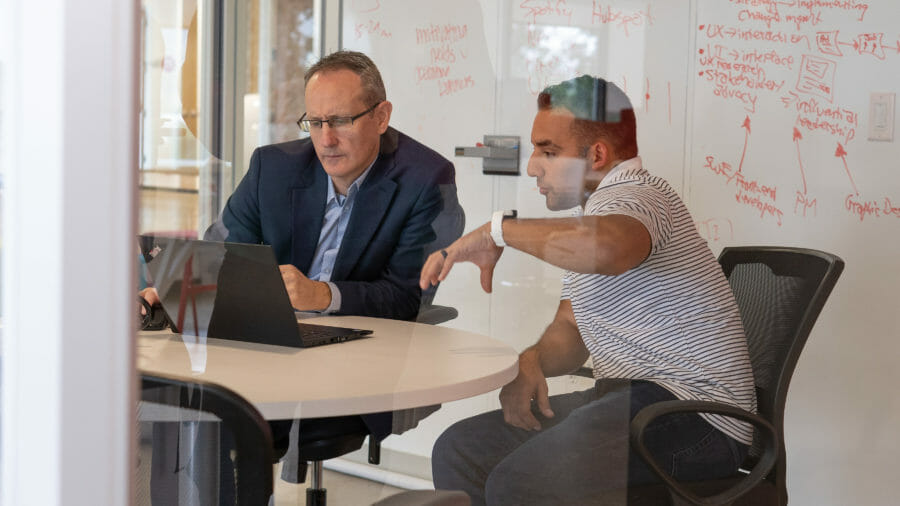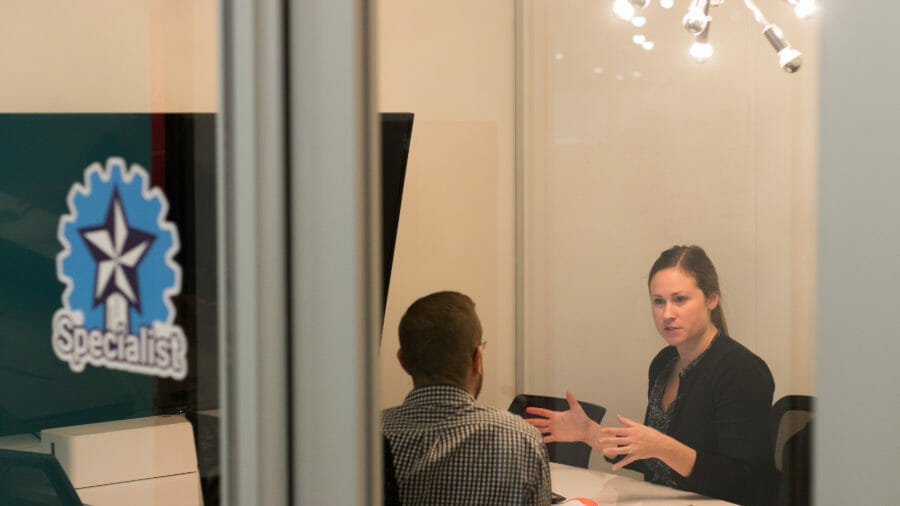For a more objective and candid view of candidates, look to these six questions when reaching out to references.
Do you have a positive attitude at work? Are you a team player? What skills and experience do you have in order to succeed at the position we are interviewing you for?
When you ask prospective employees the above questions, you already know what the answers are going to be even before they open their mouth… the right answers. You try to use these basic questions to find out whether the person on the other side of the desk is a hard worker who can work well with colleagues and has the ability to perform assignments that the job requires. But you also need objective answers to these crucial questions.
How reference checks make the hiring process more effective
Interviewing prospective employees has long been an integral part of the hiring process. It should remain so, but the hiring process needs to be more efficient. Why should you interview 20 people when 10-minute phone conversations with references could help you find out that 15 of your candidates don’t have the skills and/or attitude to handle the job or fit for your company? Why should you be so reliant on one-on-one interviews when you know some less qualified candidates will have superb interviewing skills while some of the best candidates are not comfortable talking about themselves?

Why checking references is so important
Talking to references before talking to the candidates is a crucial part of the hiring process that is often overlooked. The job candidates’ references are, by definition, not completely objective, but if you ask the right questions you can get a more objective analysis of whether they are the best choice for your company.
Someone from your company needs to verify the information on the job candidates’ resumes, such as work dates and job responsibilities, but those aren’t the questions we are talking about. You should also be conversational with the references you phone, creating a rapport with them before asking questions.
Hopefully, at least one of the candidate’s references is an individual you trust, someone who is known in the industry or possibly a college professor you have talked to before about other job candidates. In the long run, making it a point to talk to candidates’ references before you talk to them will increase the number of references you can rely on, increase the odds that you interview the right candidates, and improve the questions you ask the candidates.

Questions to ask references
The questions we have formulated for your references are not “yes or no” questions, but if you have established a rapport with the reference, you can ask, for example, “Give me an example of an instance where he/she showed initiative in the workplace?” and expect a detailed answer with examples rather than a one-word answer.
Here are six questions you should consider asking your job candidates’ references that can help you ascertain the skills, attitude, and future of the candidate you are thinking of hiring.
1. What were their best accomplishments while working on their own?
You could ask simply “how did they perform on the job?” but he/she could have done an excellent job and still not be the right fit for the available job. This question gives you the chance to learn whether they have the skills to work at the job that is open and whether they will be a good long-term fit for the company. It also gives you an opportunity to learn whether they are an independent worker who doesn’t require your constant guidance. If the accomplishments involved a comprehensive project, you could also learn that the person has perseverance and dedication.
2. What were their best accomplishments while working with a team?
An employee can have more skills than any other employee who ever worked for your company, but he or she could also hurt the company by trying to do everything alone and displaying a lack of respect for colleagues. You could ask “are they a team player?” but you want to dig deeper. You don’t want the reference to tell that he/she is a team player. You want the reference to essentially SHOW you the candidate is a team player via specific anecdotes. Hopefully, the anecdotes will show that he/she has leadership qualities and the ability to inspire colleagues to perform to the best of their abilities.
3. What were their best ideas for improving your company?
On the surface, this is only a question for job candidates who have had leadership positions in other companies. However, this can also be a good question for lower-level employees. Take a position at a newspaper, for example. At the paper, a few young reporters may have offered story ideas even though the odds they would actually be the ones writing and reporting on the story were slim because it was beyond their level. Although they may have not gotten chosen to write the article, this situation shows that he/she is a team player who was interested in the quality of the newspaper. Their initiative is also a good indicator that the employee wanted to improve their skills and knowledge base in this specific industry.

4. How did they grow at your company?
The candidate’s resume should be in front of you as you ask this question. Dig deeper than the resume’s depiction of job titles and promotions. You want to know how fast the person has grown in skill, ability to contribute to a company, and ability to manage people (if applicable). You want to assess whether the candidate can grow at your company as opposed to just being able to perform at the current job. If he/she is a student, ask professors about their growth in academics, being a mentor to younger students, and personal characteristics, such as being more prepared than other students for various kinds of projects or assignments.
5. How do they handle adversity?
Most professional athletes are happy and productive when they and their team are performing well. But then they’re suddenly benched or their team starts to lose. The best players react positively. They play harder, remain positive, boost teammates’ morale, and work on correcting their skill deficiencies. The best employees react to adversity the same way the best sports stars do. Ask the reference how the candidate reacts to constructive criticism – Does he or she pout or do they use the opportunity to grow and learn?
6. Where do you see this candidate five or ten years from now?
If a candidate is applying to your company, you want to know why they left the company they were previously at. You could just flat out ask the reference why this individual left their company, but the above question might result in you learning more about his/her potential. It’s possible that their ex-company is so small that there are no opportunities for promotion. It’s also possible that you actually know this candidate already and took the initiative in considering them for the position, rather than seeking job applications.

A CareerBuilder survey reported that 27 percent of the employers who made a bad hire lost more than $50,000 because of their bad decision. If you ask prospective employees’ references the right questions you will increase the odds that the new hires will increase your revenues and profits rather than increase your expenses.
Looking to references for candid, objective viewpoints on candidates and formulating high-level interview questions aren’t the only ways to ensure you hire the best possible candidates. Download 10 other tips for discovering top talent and the key to retaining them.


